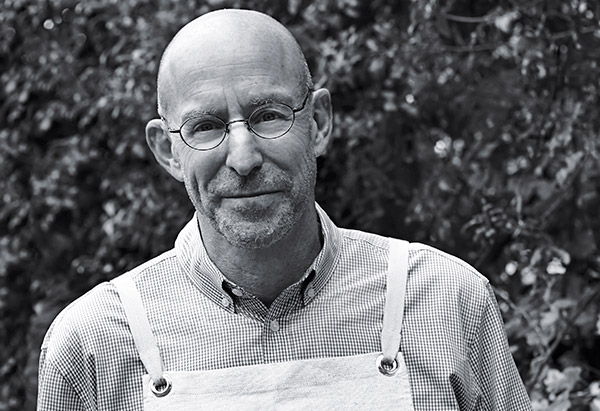What the Ultimate Food Expert Eats for Dinner

Photo: Coral Von Zumwalt
For years writer Michael Pollan has told us what to put on our plates. ("Eat food. Not too much. Mostly plants," he famously wrote.) Now he's learning what cooking is really all about: slowing down, enjoying the process, and filling the kitchen with family and friends.
On this crisp Bay Area afternoon, in his warm, bright kitchen, writer Michael Pollan is mincing shallots with great concentration—he's still slightly hesitant with a knife—as chef Samin Nosrat, a former journalism student of Pollan's at UC Berkeley, tends to a nearby pan of kale. "Samin's going to tell me to keep chopping these," Pollan says forlornly. "She always wants the shallots smaller." Sure enough, Nosrat asks him to try again, and Pollan—tall, lanky, with an easy smile and the kind of bracing intellect that makes even small talk invigorating—gamely dives back in. Tonight a few of his friends are stopping by for dinner, and he's eager to show off some new talents: Several years after establishing himself as the preeminent observer of how we eat, Michael Pollan is learning what it really means to cook.
In his best-selling books The Omnivore's Dilemma, In Defense of Food, and Food Rules, and as a consultant on the eye-opening documentary Food, Inc., Pollan, 58, has deconstructed the economic and cultural systems that influence what we eat every day, asserting that much of our food isn't food at all but a highly processed mélange of what he calls "edible, foodlike substances" often loaded with sugar, salt, fat, and chemicals. He's railed against policies that allow processed food to be priced far cheaper than healthier fare ("We've made it rational to eat badly") and helped expose the deplorable practices of most industrial meat, grain, and dairy farms. He's the guy who taught us to shop the perimeter of the supermarket, to stop eating when we're four-fifths full, to avoid consuming products with long lists of ingredients we can't pronounce.
Still, Pollan says his idea of dinner has often involved little more than throwing a steak on the grill, boiling up some packaged ravioli or heading to a restaurant. "I took cooking for granted," he admits, though he comes from a cooking family: His mother, a confirmed gourmet, is currently at work on a cookbook with his three sisters.
A few years ago, Pollan decided this gap in his knowledge needed to be addressed. "I started to realize that cooking might be the most important factor in fixing our public health crisis," he says. "People who cook eat healthier diets. And this whole renaissance of farmers' markets and community supported agriculture that's going on right now—these are economies we should support, and they depend on cooking. It was the missing link I needed to explore."
Next: Cooking connects you to plants, animals, nature and to other people



